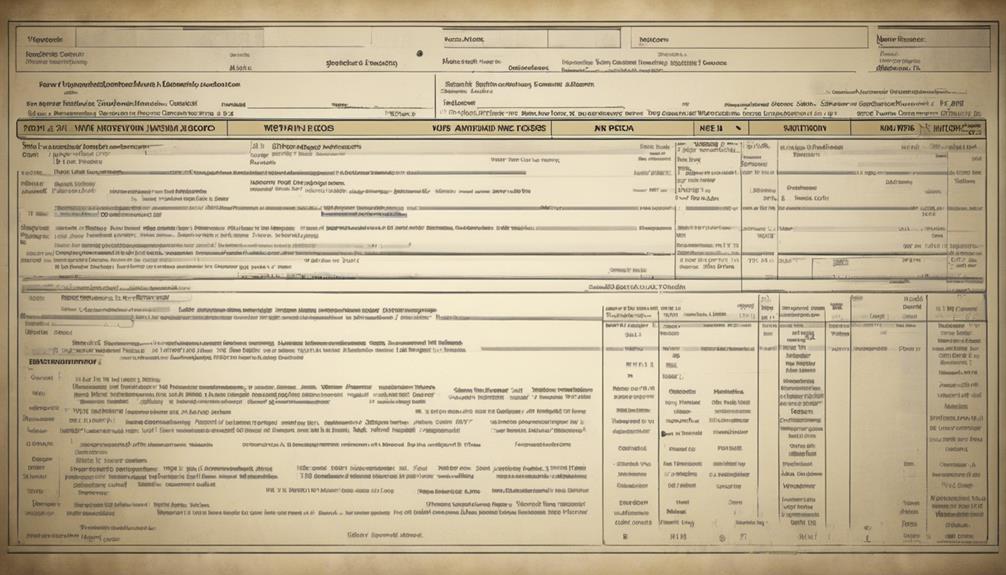Just like a compass guides us towards the north, understanding the intricacies of average VA compensation for hearing loss can reveal a clearer path for us.
Exploring the intricacies of VA benefits and compensation can shed light on crucial information that may impact veterans' lives in significant ways.
Let's delve into the realm of VA compensation for hearing loss, where valuable insights await those seeking to navigate this process effectively.
Key Takeaways
- VA compensation for hearing loss varies based on severity and daily life impact.
- Eligibility criteria and service connection are crucial for receiving compensation.
- Calculating fair compensation rates considers the extent of hearing loss and its effects.
- Strengthen VA claims with medical records, supporting evidence, and impact statements.
Understanding VA Disability Compensation
Navigating the complexities of VA Disability Compensation requires veterans to grasp the intricacies of the evaluation process to secure the support they rightfully deserve.
When it comes to hearing loss, the VA determines compensation based on the severity of the condition and how it impacts daily life. The VA disability ratings for hearing loss typically average around 10%, but they can range from 0% to 100% depending on the extent of impairment.
Veterans are eligible for compensation if their hearing loss is service-connected, meaning it occurred or worsened during military service. The Rating Criteria used by the VA considers the challenges veterans face due to their hearing loss and aims to provide adequate compensation to support them in managing these difficulties.
Determining Eligibility for VA Benefits

Understanding the eligibility criteria for VA benefits related to hearing loss involves assessing the severity of the condition and its direct link to military service. Veterans may be eligible for VA disability benefits if they've service-connected hearing loss.
In the fiscal year 2020, over 1.3 million veterans received disability benefits for hearing loss, highlighting the significance of this issue. To determine eligibility, veterans need to provide proof of service connection, undergo hearing loss tests, and receive a disability rating based on the severity of their hearing loss.
Additionally, in the same fiscal year, more than 2.3 million veterans received Tinnitus benefits, indicating the prevalence of auditory issues among veterans. Meeting the eligibility criteria is crucial for compensation eligibility, and understanding the requirements for service connection and disability rating is essential in navigating the process.
Calculating Average VA Compensation Rates
Calculating VA compensation rates for hearing loss involves evaluating various factors such as speech discrimination and audiometry test results to determine the appropriate level of support for veterans. When determining VA compensation rates for hearing loss, several crucial factors come into play:
- Severity: The severity of the hearing loss, as indicated by audiometry test results, significantly impacts the compensation rate.
- Speech Discrimination Test: Results from this test help assess how well a veteran can understand speech in different environments.
- Puretone Audiometry Test: This test measures the softest sounds a person can hear at different frequencies, aiding in determining the extent of hearing loss.
- Quality of Life: The VA considers how hearing loss affects a veteran's daily life and overall quality of life.
- Impact: Understanding the impact of hearing loss on a veteran's ability to work and engage in daily activities is crucial in calculating fair compensation rates.
Applying for VA Compensation

When seeking VA compensation for hearing loss, veterans are required to submit a claim along with pertinent medical records and documentation illustrating the impact of their hearing impairment. Applying for VA compensation involves detailing information about military service and hearing loss. Veterans can choose to apply online, in person, or by mail to initiate the process. It is crucial to include supporting evidence such as statements from family or coworkers to strengthen the claim. VA representatives play a significant role in reviewing applications, scheduling exams, and determining eligibility for hearing loss compensation benefits. Working closely with a qualified VA representative or attorney can improve the chances of a successful application. Below is a table summarizing key steps in applying for VA compensation:
| Step | Details | Importance |
|---|---|---|
| Submit Claim | Include medical records and impact documentation | Vital for claim assessment |
| Provide Supporting Evidence | Statements from family or coworkers | Strengthens the application |
| Work with VA Representative | Review, exams, and eligibility determination | Guidance through the process |
Maximizing VA Benefits for Hearing Loss
To optimize VA benefits for hearing loss, it's crucial to provide accurate information and compelling supporting evidence in your application. Working with a qualified VA representative can significantly increase the likelihood of a successful application for hearing loss benefits.
Here are five key steps to maximizing VA benefits for hearing loss:
- Follow recommended treatment plans for your hearing loss condition to show your commitment to improving your health.
- Submit relevant medical documentation such as audiograms, medical reports, and treatment records to strengthen your case.
- Consider filing an appeal if you receive a lower rating than expected or if your hearing loss worsens over time.
- Include statements from family members or coworkers detailing the impact of your hearing loss on your daily life and job performance.
- Seek guidance from a knowledgeable VA representative or attorney to navigate the complexities of the VA claim process effectively.
Frequently Asked Questions
How Does VA Calculate Hearing Loss Disability?
We calculate hearing loss disability by considering the severity of impairment and its impact on communication. The disability rating ranges from 0% to 100% depending on test results, puretone thresholds, speech discrimination, and service connection.
Specific criteria are used to assess hearing loss and determine compensation amounts. The degree of hearing loss and its effect on daily functioning are crucial in VA's calculation of disability benefits.
How Do I Win a Hearing Loss Claim With the Va?
We win a hearing loss claim with the VA by providing detailed proof of our diagnosis and its link to military service. This includes submitting evidence of in-service exposure to loud noises and attending all required examinations. It is also crucial to be transparent about how our hearing loss affects daily life. Seeking help from VA advocates or legal experts can boost our chances of success. By following these steps diligently, we can increase our likelihood of winning our claim.
Seeking help from VA advocates or legal experts can boost our chances of success. By following these steps diligently, we can increase our likelihood of winning our claim.
What Is the Configuration of Hearing Loss?
Hearing loss can be categorized into conductive, sensorineural, and mixed types, each with distinct causes. Conductive loss stems from issues in the outer or middle ear, while sensorineural is common and is often due to inner ear damage. Mixed hearing loss involves a combination of both conductive and sensorineural components.
Blast injuries or trauma during military service can result in any type of hearing loss, impacting veterans' auditory health.
Is 30% Hearing Loss a Disability?
Yes, 30% hearing loss is considered a disability by the VA. This rating reflects a moderate level of hearing loss that can impact daily life. Veterans with this rating may be eligible for disability benefits and compensation.
The severity of the hearing loss determines the assigned disability percentage. VA compensation for a 30% hearing loss rating aims to provide financial support to those affected.
Conclusion
As we navigate the complex world of VA compensation for hearing loss, one thing is clear – the process is anything but straightforward.
From determining eligibility to calculating rates and applying for benefits, it's a maze of paperwork and red tape.
But fear not, for with patience and perseverance, the rewards can be worth the struggle.
So, soldier on, veterans, and may your journey to maximizing VA benefits be filled with unexpected twists and turns.










